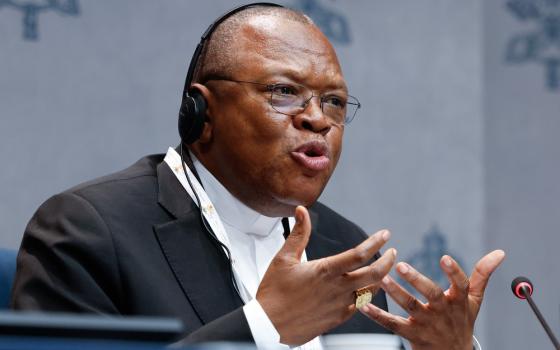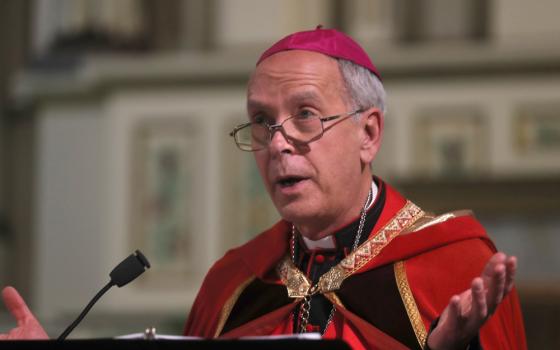
Attendees are pictured at the first Catholic Social Teaching and Investing Summit in Chicago, held Sept. 25-26. (Courtesy of the Francesco Collaborative)
Editor's Note: This is an updated version of an essay that originally appeared in the spring-summer edition of ImagineOne, a publication of the Congregation of the Sisters of St. Joseph.
In May 2019, Pope Francis invited young economists and entrepreneurs from all over the world to brainstorm ways of making the global economy more responsive to the poor and to the planet. He called for "a different kind of economy: one that brings life not death, one that is inclusive and not exclusive, humane and not dehumanizing, one that cares for the environment and does not despoil it."
And so the Economy of Francesco was born. Since its founding, the initiative has challenged and inspired thousands of young economists and entrepreneurs from all over the world to create a new economic paradigm that values the Earth and Earth's people and not only financial profit.
Elizabeth Garlow is one of the young economists whom Francis inspired. She is the co-founder of the Francesco Collaborative which "partners with faith-based investors to reimagine an investment practice anchored in Catholic Social Teaching." As an economics major at Kalamazoo College, Garlow became disillusioned with the underlying assumptions of her traditional economics courses. She had grown up in a staunchly Catholic family and wondered if there could be "a different way of thinking about how we structure and build an economy ... how we produce and provide for one another."
These wonderings led to a three-month sojourn to Argentina and Brazil for her senior thesis researching an initiative begun by the Italian lay Catholic Focolare Movement, the Economy of Communion. In South America Garlow was deeply moved by an experience of being embedded with business leaders "who were making decisions to create enterprises that centered other kinds of values ... their primary purpose was not to maximize shareholder wealth."
After graduating, Garlow spent time in Italy with Focolare learning more about alternative financing models. When she returned home, she worked with several creative nonprofits serving marginalized people who had difficulty accessing traditional sources of credit. She soon began to wonder "how to use finance as a tool to create more equitable outcomes, more beautiful communities, more relationships rooted in solidarity."

Elizabeth Garlow, right, co-founder of the Francesco Collaborative, is pictured with St. Joseph Sr. Marcella Clancy (center) and St. Joseph Sr. Erin McDonald, who participated in the "Solidarity Economy Encounter," a program hosted jointly by the Francisco Collaborative and the Congregation of St. Joseph. (Courtesy of Congregation of St. Joseph)
Garlow recognized the need "to shift the sort of logic and the dominant ideas that guide how we think about finance." She also began asking deeper questions about the role of faith and spirituality, "because I'm not sure we can get to a new financial system without dismantling the assumptions that have always guided how we think about it," she said. "And to me, that is a spiritual exercise, that is work of the heart, not just the head."
Garlow likes to quote her colleague Amanda Janoo at the Wellbeing Economy Alliance, who frequently says, "We have to stop treating people and planet like they're here to serve the economy and start treating the economy like it's here to serve us."
The Francesco Collaborative works with faith-based organizations that wish to more fully integrate Catholic social teaching within their financial decision-making, particularly in the way they invest. Toward this end, they have created a "Livable Future Investing Spectrum" to help visualize what it means to journey from an investment approach rooted in "capital supremacy" — one that prioritizes financial return, seeks wealth accumulation and extracts wealth from communities — to an approach that is "faith first," or anchored in sufficiency and structured to honor human dignity by centering relationships and fairly distributing benefits. (See the Francesco Collaborative graphic below about "capital supremacy" and a "faith first" approach.)
The collaborative offers Livable Future Investing Workshops, which are virtual formation experiences designed to "accompany faith-filled organizations and people who long to be prophetic with their investments," as the collaborative says. The workshops gather asset stewards and faith-based actors from around the world. The goal, says Garlow, is "to pray, write, reflect and collaboratively discern more holistic financial practices." To date, the organization has accompanied more than 150 workshop alumni on their journey.
In-person meetings are essential for the Francesco Collaborative community. In addition to its "investor immersions" most recently held in Morganton, North Carolina, and Detroit, Michigan, the organization convened its first-ever Catholic Social Teaching and Investing Summit in Chicago last month.
The summit, which gathered workshop alumni and other leaders in the values- and faith-aligned investing ecosystem, featured lightning talks from community members and working groups focused on themes like employee ownership, the future of religious congregations and building impact investment infrastructure in the Global South. It also set aside time for spiritual reflection and communal deepening.
The Francesco Collaborative is just one of an ever-expanding cohort of organizations working collectively to create a new economic paradigm that serves people rather than sacrificing them to a "profit first" mentality.
Last fall, the Francesco Collaborative combined efforts with the Catholic Impact Investing Collaborative, which launched its Catholic Impact Investing Pledge in 2019. Today, a global group of 40 pioneering Catholic institutions with representation from seven countries are pledge partners. Signers included Catholic philanthropic foundations, prominent international groups such as Catholic Relief Services and many national and international orders of Catholic sisters. With over $40 billion in assets, they are leading the way in impact investing.
According to the Global Impact Investing Network, impact investments are made with the intention of generating "positive, measurable social and/or environmental impact alongside a financial return." Such investments may include investing in groups shut out of capital markets such as companies addressing the unmet needs of underserved populations and/or funds owned and/or led by women, people of color and other disenfranchised groups. Such loans yield a modest financial return but facilitate impact for good in the communities involved.
Advertisement
Other impact investment strategies provide market rate returns on investments that positively impact global sustainability. For example, the Sisters of Mercy have an Environmental Solutions Fund that invests in companies with "mission-related, positive, market-rate alternative investment strategies in cleantech, water, green buildings, and sustainable agriculture and forestry."
Today, these organizations primarily work with decision-makers in faith-based organizations including religious communities, health care institutions, schools, dioceses, nonprofits, philanthropic foundations, Protestant churches and the like.
Which leads one to ask, how can we as ordinary Catholics align ourselves to a "faith first" approach with our investments?
As believers we cannot divorce our financial investment decisions from our Catholic-Christian value system. Financial investment products are complex entities, so it can be all too easy to turn our money over to our financial adviser and think no more about it (except to occasionally check that they are profitable). All the while, unbeknownst to us, our hard-earned money is funding unethical practices destructive to the environment and to marginalized communities.
So how can ordinary Catholics support a new "faith first" economic paradigm? Here are some thoughts:
- Encourage your parish, diocese or favorite nonprofit to engage in an examination of "faith first" values in their investment strategies. Ask them to have their wealth managers explore the Livable Future Investing Workshop given by the Francesco Collaborative.
- Spend time evaluating and exploring how closely your own investment practices align with Catholic Social Teaching — you can use the Laudato Si' investing reflection guide at FaithInvest.org.
- Explore financial products that more closely align individual investments to a "faith first" approach while making a responsible profit. For example, explore sustainable banking from the Laudato Si Action Platform. Garlow also suggests exploring groups like Carbon Collective, Just Futures, Green Retirement and For Us All as you consider how to invest retirement savings.
In his encyclical "Laudato Si', on Care for Our Common Home," Pope Francis identified critical issues facing our global family, saying: "The urgent challenge to protect our common home includes a concern to bring the whole human family together to seek a sustainable and integral development, for we know things can change."
"For we know things can change," says our pope.
Will you join our visionary young economists in creating a new economic paradigm so that all Earth's peoples may become the change we seek?







